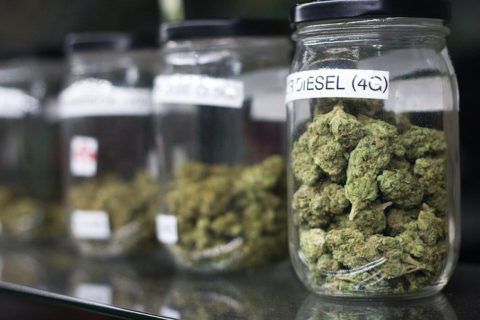How will California’s four U.S. attorneys respond on pot after Sessions’ policy change?
by Chris Reed | January 17, 2018 3:07 am
 U.S. Attorney General Jeff Sessions’ Jan. 4 announcement [1]that he had revoked the Obama administration’s policy of allowing states to make marijuana use and sales legal without fearing a federal crackdown and would leave it up to his 94 local U.S. attorneys’ offices to decide their policies created deep anxiety in the California marijuana industry – coming as it did the same week the Golden State became the sixth state to begin permitting recreational pot use.
U.S. Attorney General Jeff Sessions’ Jan. 4 announcement [1]that he had revoked the Obama administration’s policy of allowing states to make marijuana use and sales legal without fearing a federal crackdown and would leave it up to his 94 local U.S. attorneys’ offices to decide their policies created deep anxiety in the California marijuana industry – coming as it did the same week the Golden State became the sixth state to begin permitting recreational pot use.
While none of the four U.S. attorneys’ offices in California have taken high-profile enforcement steps to date, at least two may be inclined to take on legal marijuana in some way – especially given that Sessions has already complained that pot being grown in the state is being trafficked in other states where it remains illegal.
In the California Eastern District based in Sacramento, President Donald Trump nominated McGregor “Greg” Scott to serve as U.S. attorney, returning to a job he held under President George W. Bush. He was sworn in[2] Dec. 29. His large district is mostly inland California, from the Oregon border to the Inland Empire, including Humboldt County, ground zero for the Golden State’s pot culture.
Cannabis advocates worry about Sacramento U.S. attorney
While the Sacramento Bee editorial page hailed [3]Scott’s selection, the Bee’s newsroom reported [4]earlier this month that marijuana advocates are on edge because of Scott’s history of aggressively targeting medical marijuana in his first stint on the job. Scott’s office received national attention in 2008 when it secured 20-year and 21-year sentences for two Modesto men whom Scott said were running a criminal empire – not a clinic.
The Cal NORML marijuana advocacy group blasted Scott for urging local prosecutors to refer medical marijuana cases to his office, calling it “particularly notorious for harsh sentences against medical marijuana defendants.”
“He used to be a hardcore, anti-cannabis drug warrior,” Sebastopol criminal defense attorney Omar Figueroa told the Bee. “I hope he has evolved.”
Scott offered no overview of his intentions beyond issuing a statement saying he would review marijuana cases “in accordance with our district’s federal law enforcement priorities and resources.”
Cartel prosecutor takes reins in San Diego with tough statement
The other California U.S. attorney who might be inclined to take a hard line on pot is Adam Braverman in the San Diego-based Southern district. Braverman was sworn in [5]Nov. 16 after years as a hard-charging prosecutor in the San Diego office targeting drug cartels which operate on both sides of the U.S-Mexico border. His statement echoed Sessions’ remarks that individual states should have no expectations that federal drug laws would go unenforced just because their voters or legislators had approved legal use of pot.
“The Department of Justice is committed to reducing violent crime and enforcing the laws as enacted by Congress. The cultivation, distribution and possession of marijuana has long been and remains a violation of federal law,” Braverman’s statement said. “We will continue to utilize long-established prosecutorial priorities to carry out our mission to combat violent crime, disrupt and dismantle transnational criminal organizations, and stem the rising tide of the drug crisis.”
Earlier this month, former prosecutor and criminal defense lawyer Nicola Hanna was named interim U.S. attorney for the Central District, based in Los Angeles. Hanna, who is expected to get the job on a permanent basis, has kept quiet on Sessions’ announcement. His office refers questions to Justice Department headquarters in Washington.
Any crackdown on cannabis might be difficult just from a resources perspective for Hanna. His office serves an area with 18 million residents in Los Angeles and Orange counties and five adjacent counties – by far the most heavily populated of any office. It is often responsible for complex cases involving not just drugs and white-collar crime but also national security.
Views of acting U.S. attorney in San Francisco unclear
In the Northern District based in San Francisco, U.S. Attorney Brian Stretch resigned within days after Sessions’ policy change, though he said the decision was unrelated.
Alex G. Tse [6]is serving as the acting U.S. attorney after being Stretch’s second-in-command. Tse has kept a low profile to date on Sessions’ policy reversal.
However, his office was known for its aggressive targeting of Oakland’s Harborside Health Center, which the Feedly marijuana news website says[7] is “perhaps the state’s best-known dispensary.”
The 9th U.S. Circuit Court of Appeals, based in San Francisco, threw out[8] prosecutors’ case against Harborside in 2016, saying they had ignored Congress’ direction that medical-marijuana dispensaries operating within state laws should be left alone.
- announcement : https://www.justice.gov/opa/press-release/file/1022196/download
- sworn in: https://www.justice.gov/usao-edca/pr/mcgregor-w-scott-sworn-united-states-attorney-eastern-district-california
- hailed : http://www.sacbee.com/opinion/editorials/article184383798.html
- reported : http://www.sacbee.com/news/state/california/california-weed/article193086764.html
- sworn in : https://www.justice.gov/usao-sdca/pr/adam-braverman-sworn-united-states-attorney-southern-district-california
- Alex G. Tse : https://www.justice.gov/usao-ndca/meet-us-attorney
- says: https://www.leafly.com/news/politics/heres-where-us-attorneys-stand-on-cannabis-enforcement
- threw out: https://www.leafly.com/news/politics/federal-court-bars-justice-department-from-prosecuting-medical-ca
Source URL: https://calwatchdog.com/2018/01/17/will-californias-four-u-s-attorneys-respond-pot-sessions-policy-change/